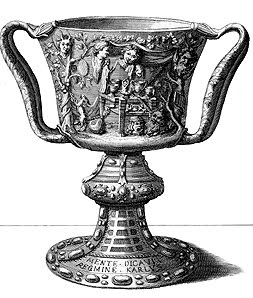
Herein is the start of my "table-side tales" as a Sommelier in Southern California. I began my first official Sommelier job about 1 month ago at a nice Tuscan Italian restaurant in the Los Angeles area. So far it has been a full and unique experience getting to know the staff, the management, the regular customers, and the pitfalls to avoid as a new Sommelier. In this first post of my "table-side tales" I want to comment about the most frequent response I receive to my most frequent question that I ask customers who have requested my help. After I offer to assist in the selection of a bottle or glass of wine I often hear something like "we would like to choose a red... or a white wine... what do you suggest? I often reply "is there a particular style of white/red wine that you usually drink...?" Answers to this question usually don't help much, instead I am told "I just don't want the wine too dry." Occasionally I hear the opposite, "I would like a glass of dry chardonnay... "but not as often. For the last 3-4 weeks my response to this persistent criteria has been evolving. What is usually intended by "we don't want the wine too dry," is we want a wine that has "some sense of sweetness" perceived in the wine. The problem w/this narrow two-prong criteria is 1) it's based on an incorrect view of what "dry wine" is and 2) it provides very little help for me the Sommelier to recommend a suitable wine.
What is "dry wine?" Just about all the wines on your local restaurants wine list are "dry wines" unless you are at a dessert only bar or something w/only sweet dessert wines. When wine grapes are pressed & the sweet juice get's inoculated w/yeast at the right temp. this begins fermentation & the sugary must's journey of conversion to alcohol. Yeasts are micro-organisms designed by God to eat sugar, the by-product is alcohol, heat, carbon-dioxide, dead yeast cells, and many other blessings. The issue is at the right temp. (not too cold) the yeast don't know when to stop eating the sugar, this is true for beer or any other sugar solution. If you have the right strain of yeast &the correct dose they will eat up the sugar until all the yeast die because of the presence of alcohol, or some other man-made method arrests the fermentation. Moreover, if regular fermentation is completed you will usually have zero residual sugar left in the young finished wine. Sweet wines like Port are made by adding alcohol like brandy toward the end of fermentation which kills the remaining yeast and leaves a good amount of residual sugar.
What does this all mean? The chardonnays, the Napa cabs, the Pinots, the Zinfandel, the Merlot's, etc, are dry wines. A word about german Riesling later. Why do folks think dry wines are sweet then? We need to expand our wine glossary. Certain things like alcohol, tannin, body, texture, and other fruit aromas/flavors make wine "appear more sweet." It's more helpful to describe wines that you like as having: more body, black/red berry fruit flavors, spice (pepper, cinnimon, etc), earth, mineral, tropical/stone fruit flavors/aromas, soft/silky tannins, concentrated, dark/purple, bright, clean, fresh, and there are hundreds of other ways to describe wines. I don't expect average folks who drink $9 BevMo to know all the wine jargon like the Sommelier, then I wouldn't have a job after all.... but it would be nice if we could develop a few more words other than dry & sweet to express thoughts about a drink that is a bit more exalted than their daily Yuban or Coke Zero.
